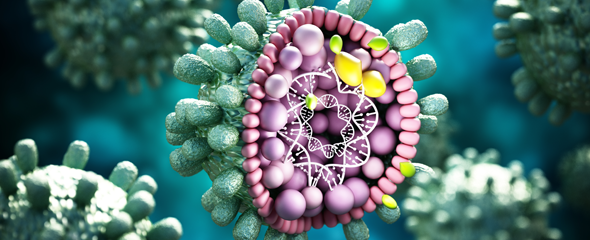It is estimated that more than 250 million people worldwide are chronically infected with the hepatitis B virus. Cytotoxic T cells and T helper cells play an important role in fighting viral infections. The constant activation of these immune cells in chronically infected patients leads to cell exhaustion in the long term. However, their activability is a prerequisite to benefit from immunotherapies. The virus causes infected liver cells to produce large amounts of hepatitis B surface proteins (“hepatitis B surface antigen”, HBsAg). These proteins intercept antibodies and thus further weaken the immune response. Therefore, HBsAg is currently considered a decisive factor for the impaired immune response and is used for the so-called stratification of patients, i.e. the risk-adjusted classification into treatment groups for new therapy options.
In the current study, the team led by Prof Markus Cornberg and Dr Anke Kraft investigated the T-cell response of patients with a chronic hepatitis B virus infection. Cornberg, deputy director of the Clinic for Gastroenterology, Hepatology and Endocrinology at the MHH, heads the research group “Immunology of Viral Hepatitis and Infections in Liver Cirrhosis” at the CiiM together with Kraft, is Clinical Director of the HZI and Deputy Coordinator of the “Hepatitis” research area at the German Center for Infection Research (DZIF). The researchers found that the T-cell responses were not associated with the HBsAg level in the blood, but rather influenced by the age of the patients. “Younger patients, who have probably not been chronically infected with the virus for so long, show a stronger T-cell response to the virus,” says Cornberg. “Since this is a prerequisite for successful immunotherapy against the virus, new immunotherapies should primarily be studied in these patients.”
In addition, the team looked for alternative biomarkers to predict therapy outcomes. They found that the T-cells of infected patients with a low blood level of another viral marker (“hepatitis B core-related antigen”, HBcrAg) had better immune function. “Our study shows us factors that we can use to identify patient groups for whom immunotherapy may be particularly promising,” says Kraft. Personalised methods to treat infectious diseases are also the research goal of Prof Yang Li, co-director of CiiM and head of the department “Computational Biology for Individualised Medicine” at HZI, who was also involved in the study. She says: “For many infectious diseases, we can achieve better therapeutic success if we take individual differences into account. With the biomarker we describe in this study, we are taking a step in this direction in hepatitis B therapy.”
Original publication:
Elmira Aliabadi, Melanie Urbanek-Quaing, Benjamin Maasoumy, Birgit Bremer, Martin Grasshoff, Yang Li, Christian E Niehaus, Heiner Wedemeyer, Anke R M Kraft, Markus Cornberg. Impact of HBsAg and HBcrAg levels on phenotype and function of HBV-specific T cells in patients with chronic hepatitis B virus infection. Gut. Published Online First: 26 October 2021. doi: 10.1136/gutjnl-2021-324646
Editorial on the publication:
Bertoletti A, Boni C. HBV antigens quantity: duration and effect on functional cure. Gut. 2021 Nov 19:gutjnl-2021-326258. doi: 10.1136/gutjnl-2021-326258. Online ahead of print. PMID: 34799373

